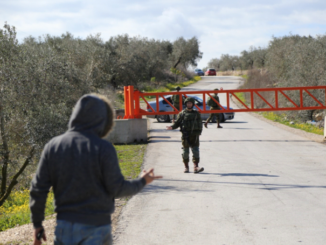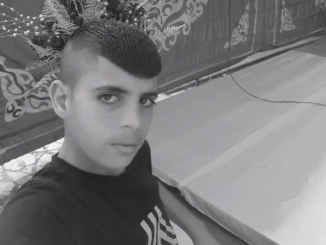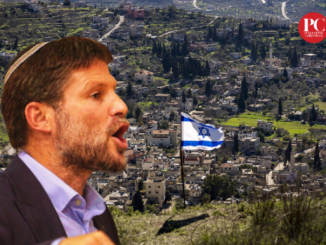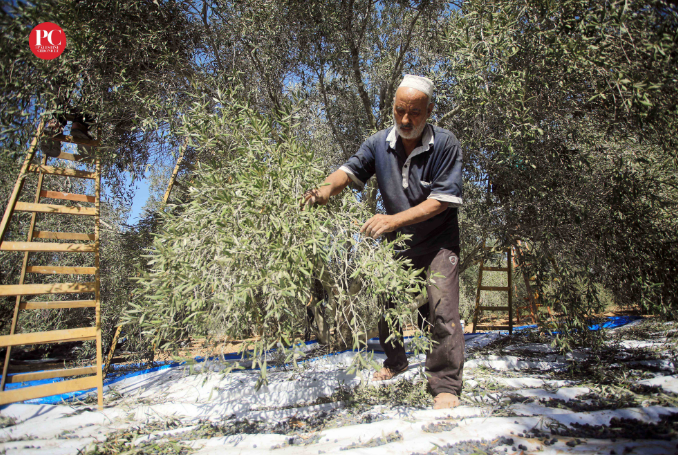
Though the illegal settlers may think that their constant harassment and violence against Palestinians will eventually drive them away from their land, in reality it will do just the opposite.
Bilal Saleh, 40, used to take his family every year to harvest olives from their orchards located in the village of Al-Sawiya, south of Nablus.
In other seasons, Saleh collected different types of leafy vegetables and sold them from a humble cart on the streets of Ramallah to earn a little money.
It was a livelihood drenched in fatigue, but during this season it has become drenched in blood.
Bilal was killed on Saturday afternoon by a settler’s bullets while harvesting the olives from his trees that he loved and tended with great care.
His only crime was that he wanted to reap the fruits of his labor in his little olive grove, of which he was denied access since the beginning of the season.
Ahmed Saleh, one of his relatives, told the Palestine Chronicle that the family tried several times to harvest the olives located on the outskirts of the town, but the Israeli army and settlers installed barriers so that local families were denied access. The army barricaded side roads and chased families away who attempted to reach the orchards by alternate routes.
“We tried to reach our trees, but every time we were attacked by soldiers or by settlers. This time we decided to go on Saturday because we thought the settlers would be observing the Sabbath. It seems that they never take leave from killing us!” Saleh told the Palestine Chronicle.
Bilal and his family were able to reach their trees after hours of trying. They had to carry their belongings and walk on foot, but they were very happy to arrive.
A short time before Bilal was shot, he took photos with his family, gladly picking his olives. Bilal was hit by a bullet in the chest and fell to the ground. His family struggled to evacuate his lifeless body, using a ladder as a stretcher, because soldiers had barricaded the roads, preventing access to ambulance crews.
“His blood mixed with the earth. Everyone stood there in shock, not knowing what to do. Settlers were firing intensely, the army was watching from afar, the village was boiling with anger, and hours later they arrested his brother on the pretext that they had seen a Hamas flag at his funeral!” Ahmed said.
Sorrow befell the entire town. No one wanted to believe what had happened to Bilal’s family.
Season of Blessing
Olive trees are a profound symbol of Palestinian identity. Many of the olive trees in Palestine are thousands of years old and Palestinians have taken care of them, just as they care for their own children.
They wait for the olive harvest with great anticipation, as it signifies goodness and blessings, and it connects them to their land again. It is a distraction from their life of struggle.
When you pass through any village, town, or city in the West Bank, you find mountains and plains covered with olive trees, many of which are located in lands classified as C according to the Oslo Accords which means that they are under full Israeli sovereignty.
Suffering
The town of Nahalin, west of Bethlehem, is surrounded by seven Israeli settlements, forming a wall which completely envelops the town. These settlements were configured in such a way to confiscate the largest swath of land possible, land that had been cultivated for generations with countless groves of trees and crops.
Despite these dangers, Palestinians insist on harvesting their olive trees every season.
Journalist Ghassan Najajra, a resident of the town, told the Palestine Chronicle that since October 7, the Israeli army has closed the entryways Nahalin, preventing families from reaching their lands.
Since the beginning of the season, families have been subjected to many attacks, including the theft of their crops that have been harvested. They have been assaulted by the settlers, being struck with batons and stones. This happens in full view of the Israeli army, yet nothing is done to stop the violent acts and theft committed by the settlers.
“Several Palestinian families decided to go in large groups to their lands through backroads, so that they wouldn’t be exposed to attacks by settlers and soldiers. To do so, they were forced to walk a distance of 1.5 km on foot, carrying with them their harvested produce and equipment,” Najajra added.
Though the illegal settlers may think that their constant harassment and violence against Palestinians will eventually drive them away from their land, in reality it will do just the opposite. Despite the daily hardships and difficulties that lie ahead, the people of Al-Sawiya, Nahalin and numerous other Palestinian towns and villages are more committed to their lands than ever.
(The Palestine Chronicle)
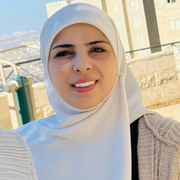
– Fayha’ Shalash is a Ramallah-based Palestinian journalist. She graduated from Birzeit University in 2008 and she has been working as a reporter and broadcaster ever since. Her articles appeared in several online publications. She contributed this article to The Palestine Chronicle.

